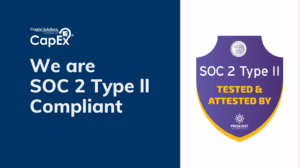Is your company stuck in ‘spreadsheet hell?’
Top performing companies that are keen on achieving rolling forecasts and projections, while monitoring projects from inception to completion, are quick to ensure that data is flowing freely throughout their internal departments.
Finance professionals often say that they need a way to make it easer to integrate the processes and workflows that take place between teams; and, that this should be achieved to make the lives of non-financial users easier. Yet, the reality is that financial data is often complicated to interpret, and should be presented in a format that is clear and insightful. Companies that want to stay ahead use intuitive and easy-to-use reporting systems to alleviate the problems of tedious, manual processing when it comes to having visibility into finances.
When we use accurate reporting, capital expenditure (CapEx) becomes consolidated and we are given a granular view on data. When we track information, and have designed proper processes, we can hold our company’s C-level execs and internal teams accountable for their expenditures.
Having accurate reporting makes it possible to gain clear insight into the performance and financial health of an organization. But, it often takes a lot to convince upper management to invest in technology that will consolidate data.
Let’s look at 6 benefits that we can gain from accurate reporting:
- We can compare planned CapEx to actuals at a more detailed level so stakeholders can easily investigate costs and budgeting.
- We gain a full understanding of how changes to capital expenditure management
- Impact our income statements, balance sheets, and cash flow statements.
- We are able to achieve accuracy and accountability by involving c-level execs.
- We are able to review historical capital expenditure spending patterns to outline and have a framework for projections.
- We can eliminate manual processes as a result of automating calculations, and the ability to see, in real-time, the effect of changes like depreciation rates, repairs, and maintenance.
- We can work with KPIs to evaluate CapEx assumptions.
In order to run a successful business, implementing a reporting solution will ensure that teams use the kind of tools that will free up time for higher-level decision-making. A good reporting solution will enable departments to consolidate data from all systems.
With the right reporting framework, it also becomes manageable to distribute reports throughout the organization. A comprehensive reporting system creates a security hierarchy that determines which users have access to which reports in order to have access to specific information.
Your internal teams will have the ability to analyze performance, as reporting will entail variance functionality to perform analysis. By tracking ongoing results, your financial department will see all progress using visualization dashboards.
The right technology is critical to make financial processes like reporting improve profitability and minimize risk. With the right balance of simplicity and depth, reporting makes it possible to collaborate internally, manage data, and analyze it to make smarter decisions.
How accurate is your reporting? Are you using consolidated data to drive your business forward?




